AMPED Read online
This book is a work of fiction. The characters, incidents, and dialogues are products of the author’s imagination and are not to be construed as real. Any resemblance to actual events or persons, living or dead, is entirely coincidental.
Copyright © 2012 by Douglas E. Richards
[email protected]
Author’s E-mail address: [email protected].
ISBN: 978-0-9853503-0-7
All rights reserved. With the exception of excerpts for review purposes, no part of this book may be reproduced or transmitted in any form or by any means, electronic or mechanical, including photocopying, recording, or by any information storage and retrieval system.
First Edition
Printed in the United States of America
ABOUT THE AUTHOR
Douglas E. Richards is the New York Times & USA Today bestselling author of WIRED, and its sequel, AMPED. He has also written five middle grade/young adult novels widely acclaimed for their appeal to boys, girls, and adults alike. In 2010, in recognition of his work, he was selected to be a "special guest" at San Diego Comic-Con International, along with such icons as Stan Lee, Ray Bradbury, and Rick Riordan. Douglas has a master’s degree in molecular biology (aka “genetic engineering”), was a biotechnology executive for many years, and has authored a wide variety of popular science pieces for National Geographic, the BBC, the Australian Broadcasting Corporation, Earth and Sky, Today's Parent, and many others. Douglas currently lives in San Diego, California, with his wife, two children, and two dogs.
To my insanely talented sister, Pamela Richards Saeks, for her undying encouragement, support, and assistance, which have all meant the world to me.
AMPED
Douglas E. Richards
Paragon Press
Prologue
Kira Miller approached the bulky contraption in the center of an isolated lab in the nuclear physics complex and couldn’t help but smile. It was about the size of a small car and looked like a Rube Goldberg device constructed by a plumber, or an abstract sculpture that had escaped from a museum of modern art.
But it was neither of these things.
Instead, it was the holy grail of energy production. A cold fusion reactor. A generator that would basically run on water and produce clean energy at a fraction of the current cost. Something that would revolutionize the world if it could be perfected. And if they let it.
David Desh, standing beside Kira, extended his right arm toward one section of the device and ran his hand along several of its many surfaces. Desh was technically Kira’s husband, although they only had a small wedding with a few friends in attendance, and no marriage certificate had ever been filed. In the eyes of the United States they were not husband and wife. On the other hand, in the eyes of the United States they were also both dead, buried in separate cemeteries, and long since decayed, so this wasn’t surprising.
It was well after hours and Kira, Desh, and their friend and close colleague, Ross Metzger, were alone in the expansive facility—one with a state-of-the-art electronic security system set to ensure they remained that way. The company, Advanced Physics International, had been purchased from its founder a year earlier by a broker, keeping the deep-pocketed financiers behind the transaction anonymous. Ross Metzger had been installed as CEO, and he immediately hired a president to run day-to-day operations while he worked on projects of his own.
Metzger walked over and stood by the reactor he had built in what was essentially his private lab. A lab designed to lock up tighter than Fort Knox when he wasn’t inside with just a scan of his thumbprint.
“This version is putting out about two percent more power than I’m putting in,” he explained. “Which isn’t enough to get excited about, by itself. But it proves the concept. And my smarter half is convinced he can improve this a hundred fold.”
Desh whistled.
“Congratulations,” said Kira warmly, leaning over and giving him a hug and then a peck on the cheek.
“Thanks,” said Metzger. “But we have your therapy to thank.” He grinned sheepishly. “Let’s face it, I don’t have a clue how it works. Or how to improve it.”
Kira Miller was a genetic engineer who had developed a gene therapy treatment that for short periods of time could dramatically increase human intelligence. Metzger had only gotten as far as he did because of it.
Like the rest of them, only eighteen months earlier Ross Metzger had lived a far different life. He had been a special operations major, an officer and pilot with a keen technical mind who was well schooled in aeronautics and avionics. He enjoyed math and electrical engineering in the same way that others enjoyed chess, and he had continued to learn exotic mathematics, electronics, and even cutting edge robotics as a hobby.
Now he was completely off the grid and on the core council of a team with grander capabilities and ambitions than any group in history. But a team woefully short of physicists.
So when Kira had learned of his hobby, she had pressed him into service, and he had spent months reading everything he could about nuclear physics, quantum mechanics, and chemistry. He had spent hour after endless hour carefully reading texts that were largely incomprehensible to him, knowing that during the short periods in which he was enhanced his soaring mind would find the memory traces of these thousands of pages of complex reading and grasp it all, and much more, in mere minutes. While nothing could take the place of an enhanced world-class physicist who had spent a lifetime acquiring knowledge of the field, Kira had been convinced that for a very focused problem like cold fusion, Metzger’s aptitudes and background, combined with the mother of all cram sessions, could work. The proof that she was right was now an unsightly jumble of hardware in front of them.
Metzger suggested the group adjourn to a nearby conference room so Desh could fill him in on the new facilities they were building, which were nearing completion. Before accompanying the two men, Kira took one last look at the reactor and ran her hand along some of its surfaces as had her husband. Doing so would never have occurred to her if not for him, but perhaps his boyish impulse to experience things tactilely really did allow him to better appreciate the essence of the device more fully. And if Metzger could improve it the way he thought he could—or at least the way his alter ego, with an IQ amped to the stratosphere, thought he could—this would be historic stuff.
Or maybe not. Kira couldn’t help but caution herself. Whether it would be released or not was still unclear.
Kira Miller had written the book on the science of unintended consequences. She had found a way to double the span of human life only to find upon further analysis that releasing this discovery to the world would end in disaster. That such a profound increase in human longevity would cause devastating overpopulation, economic collapse, and the inevitable self-destruction of the human race. Now she insisted that the implications of even the most breathtaking discoveries be analyzed, ad nausem, before releasing them into the wild.
Energy this cheap and abundant would power homes, businesses, cars, and factories. It would drive an unprecedented explosion of growth in world economies, changing the face of civilization overnight. But would it be too revolutionary? Would the tectonic shift it would cause be too dramatic and disruptive? And what would oil based economies—often in the world’s most volatile regions and in the hands of the most ruthless regimes—do when the rug was pulled out from under them and their ocean of money was about to run dry? Go to war? Unleash weapons of mass destruction?
Assuming the device was perfected, the final analysis would be done by the core council when their minds were amplified, but even so these questions would be brutally difficult to answer.
Kira quickly caught up to her husband and Ross Metzger, who led them from his lab, past the recessed thumbprint sc
anner just outside the door, and into a short hall. Just beyond this was another lab, about half a football field in length, with a high ceiling. It was packed with monitors, lasers, and exotic physics equipment of every kind. Even so, it was so spacious and well laid out that it was anything but crowded.
Just past the lab they arrived at one of the company’s four conference rooms. Black, high-back swivel chairs surrounded a long conference table whose cherry wood veneer was so polished it had become reflective. They settled in and began a lively discussion.
Twenty minutes later they were interrupted by a grinding sound coming from Ross Metzger’s pocket. He glanced down suspiciously and pulled out his vibrating phone. “Sorry,” he said. “Wasn’t expecting any messages.” He tapped the screen a few times with his index finger and frowned.
Desh raised his eyebrows. “Problem?”
“I’m sure it’s nothing,” he replied. “But I should check it out anyway. Wait here. I’ll be back in five minutes.” He walked to the door, but turned back before he exited. “Five minutes,” he repeated with a sly grin. “Don’t let me catch the two of you in any compromising positions when I return.”
Desh smiled back. “Come on Major, give us some credit. We’re not hormone gushing high school kids,” he said in mock indignation. “I think we can manage to keep our hands off of each other for five minutes.” He stared at Kira lecherously and raised his eyebrows. “On the other hand, since you brought it up and all . . .”
Metzger shook his head and exited, making a show of leaving the conference room door open as he did so.
Desh pulled Kira up from her chair and gathered her in his arms. “I’ve always liked the way Ross thinks,” he said, and then brushed his lips gently against hers. She responded by moving even closer and kissing him with a tender, unhurried passion. Thirty seconds later their lips parted and they opened their eyes.
And they were blind.
Their faces were almost touching, but they couldn’t see each other at all.
The entire facility had become an impenetrable cave.
Desh carefully extricated himself from the embrace, and as he did so the backup generator on premises took over and the lights snapped on with a loud thunk—and then back off, plunging them once again into absolute darkness.
Kira surged to a heightened level of alertness. A power outage could have been accidental, but one followed immediately by an outage of the backup generator had to be deliberate.
“We’ve got trouble,” whispered Desh unnecessarily. He reached out clumsily until he found Kira’s hand and took it in his.
Kira fished in her pocket with her other hand until she felt the metal LED penlight attached to her key ring. It was a red cylinder about the size of a double-A battery. Small but surprisingly powerful. She unclipped it from the ring, turned it on, and pressed it into Desh’s free hand. He shielded the light in his palm so that it provided just enough illumination for them to find the open door, and peered cautiously into the hall.
Kira jumped as a burst of gunfire filled the air, coming from the direction of Metzger’s lab. The all pervading darkness amplified her startle reflex and her heart accelerated wildly.
Desh had seen considerable action in the special forces and the gunfire threw his mind and body into a heightened state of alertness that few could match. He swept the tiny penlight in an arc through the lab until he discovered the base of a bulky, high-energy laser. Without power it was nothing more than a large paperweight—but it could still serve as a fortified hiding place. He rushed to it, almost dragging Kira behind him in his haste. “Wait here,” he whispered. “I’ll be back soon.”
“I’m coming with you,” she whispered back. “You know I can fend for myself.”
“I know you can. But wait here anyway,” he replied firmly, rushing off in the direction of the gunfire with the penlight as he did so, leaving Kira once again in total darkness and with no way to follow.
She crouched low behind the heavy steel base of the laser and strained her hearing to its limits. She was tempted to activate her cell phone for the light it would give off, but knew this would only serve to give her position away.
Shit, she thought angrily. They had become too complacent. Too sure they were completely off the grid and that their hacking skills were too accomplished for them to ever be discovered. Too sure that their breakthrough advances in electronics and optics, which they used to transmit false images to street cameras and otherwise hide their existence, were foolproof.
After a few torturously long minutes of absolute silence she heard someone enter the far end of the large lab. Was it David? If not, her only chance was to remain as quiet as possible and hope she wasn’t spotted.
Blood pounded in her ears. Not being able to see an inch in front of her was unnerving on a primal level. She had been in any number of deadly situations against incredible odds, but she couldn’t remember ever feeling as helpless, or afraid, as she did now.
A faint light source accompanied the person into the lab—a partially covered penlight. Her heart swelled with relief. It had to be David.
The form was moving quickly in her direction, slamming into small obstacles as it did so. But as it neared she could vaguely make out a bulky, monstrous shape; a shape that couldn’t possibly be David. A shape that couldn’t even be human.
She opened her mouth to gasp when what she was seeing finally registered. It was David, all right. But he was running with a large body draped perpendicularly over his neck and shoulders, in a classic fireman’s carry.
An instant later she realized that the man he was wearing like a two hundred pound scarf was Ross Metzger.
He was unconscious. And quite possibly even dead.
***
Desh thrust the tiny flashlight into Kira’s hand as he reached her location. “Lead us to an office,” he whispered, his movement remarkably steady given the dead weight draped around his shoulders and neck. “Hurry.”
Kira began picking her way between the equipment, with Desh behind her.
“Ross?” she asked simply.
“Gunshot to the stomach. I applied a makeshift bandage, but he doesn’t have much time.”
Less than a minute later they arrived at a row of large offices. Kira chose the fourth one down and threw open the door. Desh carefully lowered Metzger to the floor just outside. He searched his friend’s pockets, hoping for matches or a lighter, but came away with only a cell phone. He handed this to Kira and followed her into the office.
“A large group of Commandoes breached the facility,” whispered Desh. “A few dismantling the cold fusion reactor. Ross was able to draw the others into his lab as well. He was shot, but he managed to crawl out and scan his thumb to seal up the room.”
The battery-powered steel outer walls of the lab had just finishing sliding into place, taking the men inside by surprise, when Desh had arrived.
“Before Ross lost consciousness he told me there were at least six of them, all in black,” continued Desh grimly. “And all with night vision equipment. He said he could tell from their equipment and weaponry that they weren’t affiliated with the U.S. military or black-ops, but were high priced mercenaries. The cream of the crop.”
“Mercenaries hired by whom?” whispered Kira.
Desh shook his head helplessly. He had no idea. And he had no idea how they had managed to pull it off, either. What they had done should have been impossible. No team was that good. They had breached a facility protected by electronic security second to none—without setting off a single alarm. They had killed main and backup power using timing a Swiss watch would envy.
Desh guessed they had only made one mistake. One of them must have tripped a sensor in Ross’s lab when they had begun to dismantle the reactor, which had alerted him. Since breaching the company after hours without an alarm going off was impossible, Metzger must have thought the sensor had malfunctioned.
A deeply troubled expression marred Kira’s flawless complexion. “Ho
w long before they break out of Ross’s lab?” she whispered.
“Five minutes—ten minutes tops.”
“Five or ten minutes? I’ve seen the specs. It should take them hours—at best. You think they’re that good?”
“Better,” replied Desh simply. “But they’ll have to be cautious while they’re pulling their Houdini, just to be sure I’m not waiting to pick them off as they exit. So maybe ten to fifteen.”
Desh fell silent as he thought through their options. These men were sure to be running this op by the numbers, which meant they’d have at least one man watching the exit and one watching the parking lot, each with night vision equipment of their own. A blind man going up against a sighted adversary had about as much chance as a naked man going up against a tank.
Desh knew he only had one hope: he had to even the playing field.
If only they had brought a gellcap, the ultimate in emergency protection, things would be different. But they had become convinced they were safely off the radar. And they had decided that amplifying their intelligence outside of a secure facility, invoking their brilliant but often sociopathic alter egos, wasn’t worth the risk.
Kira lit up both cell phones in her possession and handed Desh the penlight. He began rifling through desk drawers. He stopped when he found a pocket-sized packet of facial tissue. He carefully removed all of the remaining tissue and cracked open the door, shining the penlight down the hall in both directions. The coast appeared to be clear.
“Stay by the door,” he instructed Kira. “I’m gonna torch the place. It’ll nullify their night vision advantage and set off alarms.”
The facility conducted ultra-high temperature experiments on a regular basis, so while powerful hoses were located in each lab, an automatic sprinkler system had not been installed.

 Oracle
Oracle![[2016] Infinity Born Read online](http://i1.bookreadfree.com/i/03/18/2016_infinity_born_preview.jpg) [2016] Infinity Born
[2016] Infinity Born Infinity Born
Infinity Born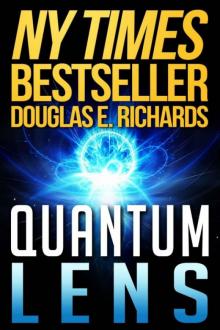 Quantum Lens
Quantum Lens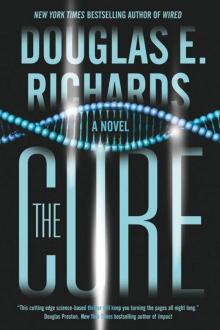 The Cure
The Cure The Immortality Code
The Immortality Code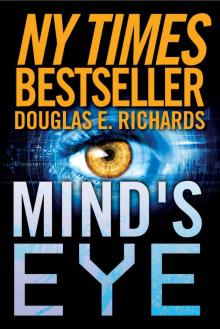 Mind's Eye
Mind's Eye MindWar (Nick Hall Book 3)
MindWar (Nick Hall Book 3)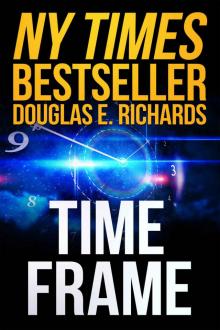 Time Frame (Split Second Book 2)
Time Frame (Split Second Book 2)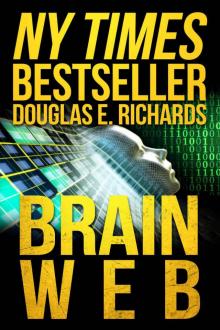 BrainWeb
BrainWeb Wired
Wired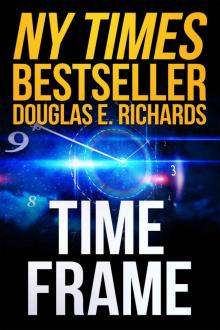 Time Frame
Time Frame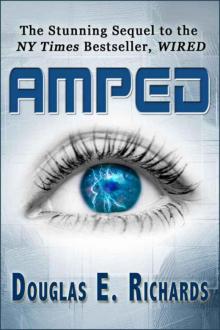 AMPED
AMPED Out of This World
Out of This World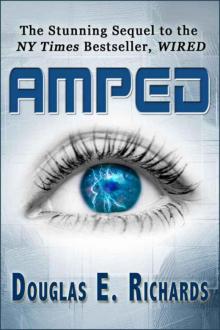 AMPED w-2
AMPED w-2